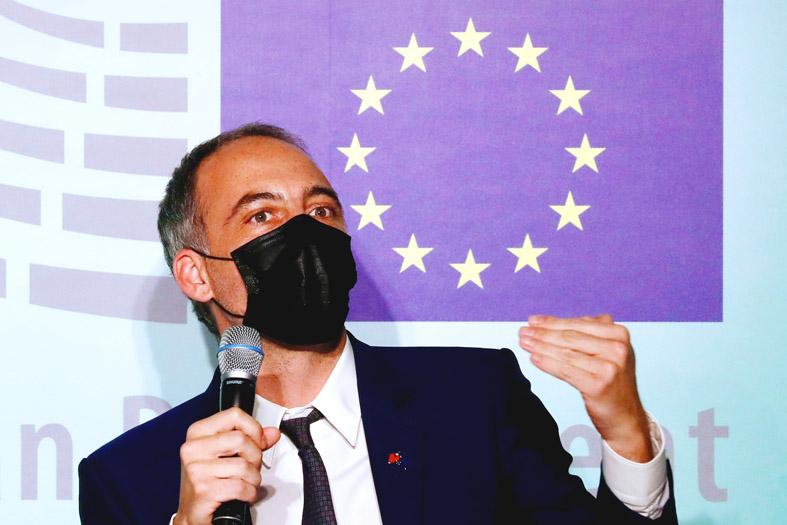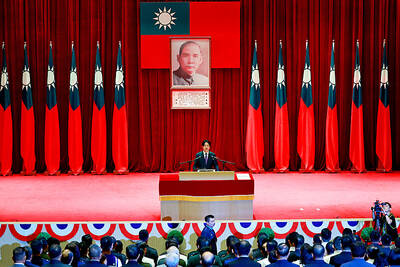The head of a European Parliament delegation that visited Taiwan last week said there is now a consensus among European political factions that cooperating with Taiwan is important for the bloc, and that he would continue to push for closer bilateral ties.
The delegation, which visited from Wednesday to Friday, comprised members of the European Parliament’s Special Committee on Foreign Interference in all Democratic Processes in the EU, including Disinformation (INGE).
In an interview with French media outlet La Liberation in Taipei on Thursday, INGE President Raphael Glucksmann, who led the delegation, said that the visit was kept low-key before the delegation departed, as the delegates did not want opposition from Beijing to muddle the focus of the visit or put improper pressure on the European Commission.

Photo: Ritchie B. Tongo, EPA-EFE
Although it was not the first time that European Parliament members have visited Taiwan, it was the first official delegation sent by the European Parliament, Glucksmann said.
In the past, there was no consensus on organizing an official delegation to Taiwan, he said, but now, people of different political factions have realized how important it is for Europe to cooperate with Taiwan, which is why the European Parliament decided to send a delegation.
Now that the first trip has been successful, a door has been opened, he said, expressing hope that such visits would become the norm and become more frequent.
During the visit, Glucksmann said that he was impressed by Taiwan’s inclusion of think tanks, non-governmental organizations and journalists in its whole-society approach to combating disinformation, as well as how Taiwan has managed to grow more open in the face of foreign threats.
Asked how supporting Taiwan benefits the EU, Glucksmann said that supporting democracies against authoritarian regimes is in the long-term interest of the EU and is an issue of principle.
If Europe does not take action, Beijing’s appetite will grow, he said, adding that history has shown that conceding to authoritarian and expansionist countries makes them increasingly hard to keep in check.
Although Europe cannot guarantee the safety of Taiwan, it can create a space where Taiwan is not isolated through exchanges in academia, culture and trade, he said.
Such engagements have prompted China to accuse Europe of causing regional instability, but these accusations are false, because cross-strait tension was high before Europe took action in support of Taiwan, Glucksmann said.
It is also because of China’s aggression that Europe has stepped up its cooperation with Taiwan, he added.
Glucksmann said that he would continue to push for closer ties between the EU and Taiwan, and advocate for a bilateral investment agreement.

TPP RALLY: The clashes occurred near the Chiang Kai-shek Memorial Hall on Saturday at a rally to mark the anniversary of a raid on former TPP chairman Ko Wen-je People who clashed with police at a Taiwan People’s Party (TPP) rally in Taipei on Saturday would be referred to prosecutors for investigation, said the Ministry of the Interior, which oversees the National Police Agency. Taipei police had collected evidence of obstruction of public officials and coercion by “disorderly” demonstrators, as well as contraventions of the Assembly and Parade Act (集會遊行法), the ministry said in a statement on Sunday. It added that amid the “severe pushing and jostling” by some demonstrators, eight police officers were injured, including one who was sent to hospital after losing consciousness, allegedly due to heat stroke. The Taipei

NO LIVERPOOL TRIP: Taiwan’s Lin Yu-ting, who won a gold medal in the boxing at the Paris Olympics, was embroiled in controversy about her gender at that event Taiwanese boxer Lin Yu-ting (林郁婷) will not attend this year’s World Boxing Championships in Liverpool, England, due to a lack of response regarding her sex tests from the organizer, World Boxing. The national boxing association on Monday said that it had submitted all required tests to World Boxing, but had not received a response as of Monday, the departure day for the championships. It said the decision for Lin to skip the championships was made to protect its athletes, ensuring they would not travel to the UK without a guarantee of participation. Lin, who won a gold medal in the women’s 57kg boxing

The US has revoked Taiwan Semiconductor Manufacturing Co’s (TSMC, 台積電) authorization to freely ship essential gear to its main Chinese chipmaking base, potentially curtailing its production capabilities at that older-generation facility. American officials recently informed TSMC of their decision to end the Taiwanese chipmaker’s so-called validated end user (VEU) status for its Nanjing site. The action mirrors steps the US took to revoke VEU designations for China facilities owned by Samsung Electronics Co and SK Hynix Inc. The waivers are set to expire in about four months. “TSMC has received notification from the US Government that our VEU authorization for TSMC Nanjing

CHINESE INCURSIONS, SORTIES: President William Lai thanked military officers for shouldering the responsibility of defending the survival and development of Taiwan President William Lai (賴清德) yesterday said that aggression would inevitably fail, pointing — on the day before a mass military parade in Beijing — to the lessons from World War II and key victories Taiwan claims against Chinese forces in 1958. Taiwan has over the past five years repeatedly complained about heightened Chinese military activity including war games around the nation as Beijing steps up pressure to enforce territorial claims that Taipei rejects. Chinese President Xi Jinping (習近平), flanked by Russian President Vladimir Putin and North Korean leader Kim Jong-un, are to oversee a military parade in Beijing today to mark the